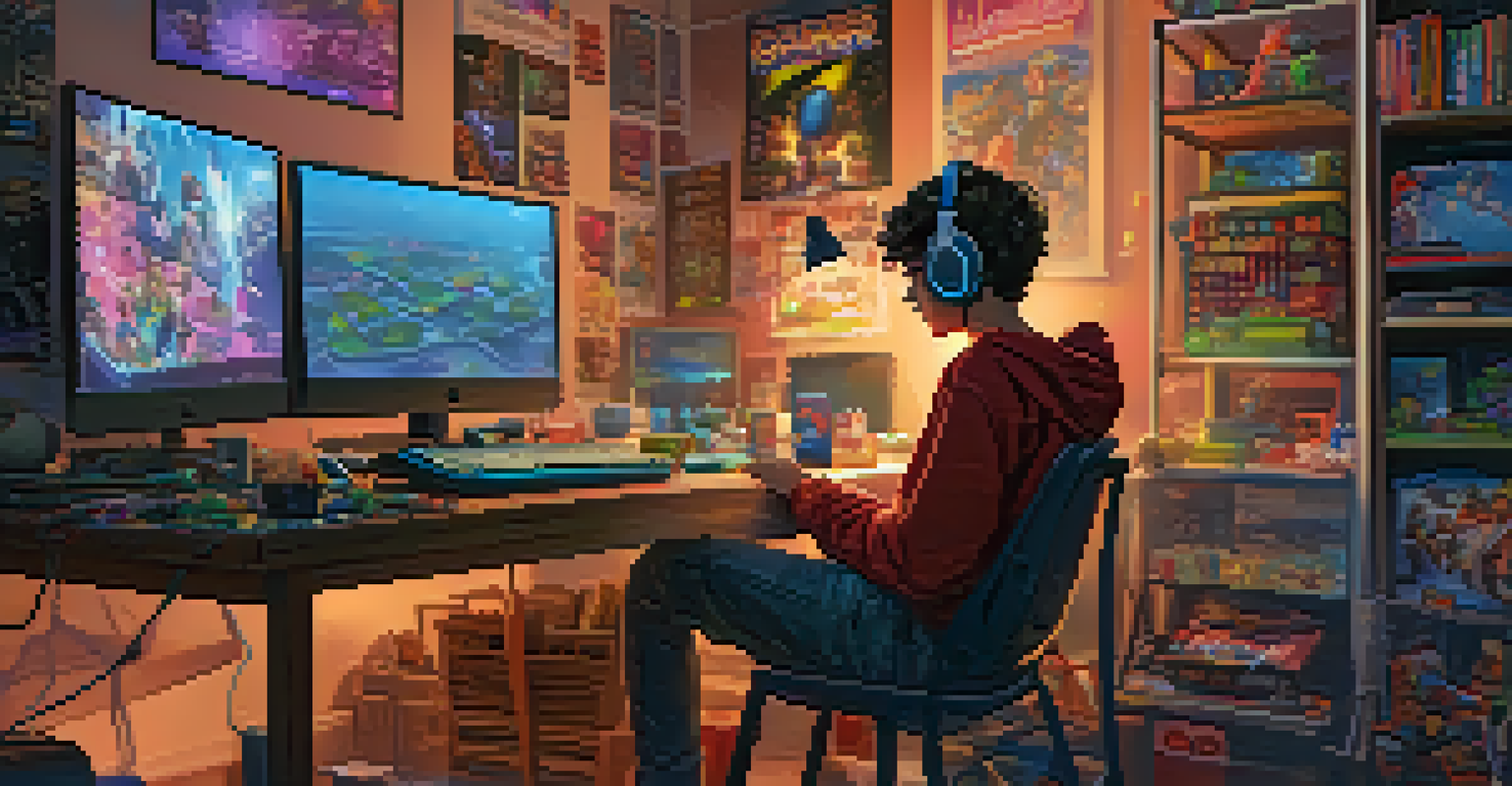Impact of Online Gaming on Youth: Risks and Recovery Options

Understanding Online Gaming: A Brief Overview
Online gaming has evolved into a massive industry, captivating millions of young people worldwide. From immersive role-playing games to competitive esports, the variety of options available can be overwhelming. These games often provide a sense of community and belonging, which can be particularly appealing to youth. However, it's important to recognize that this virtual world has both positive and negative aspects.
Video games are bad for you? That's what they said about rock and roll.
While gaming can enhance skills like teamwork and problem-solving, it can also lead to potential risks. The line between healthy gaming and excessive use can blur, especially for impressionable teenagers. Understanding the nature of online gaming is crucial in addressing its impact on youth, both positive and negative.
As we delve deeper into the effects of online gaming, we will explore the risks involved and provide recovery options to help young gamers maintain a balanced lifestyle.
The Positive Aspects of Online Gaming for Youth
Despite the risks associated with online gaming, there are several notable benefits. For instance, many games require strategic thinking and quick decision-making, which can improve cognitive skills. Additionally, online gaming can foster social connections, allowing players to make friends and communicate with peers, often leading to strong, supportive communities.

Moreover, some studies suggest that gaming can reduce stress and anxiety, providing an escape from daily pressures. This can be particularly beneficial for young people navigating the challenges of adolescence. Games can also encourage creativity, especially in genres that involve building and designing worlds.
Positive Effects of Online Gaming
Online gaming can enhance cognitive skills, foster social connections, and reduce stress for young players.
However, while these benefits are significant, they must be weighed against the potential downsides of excessive gaming. Recognizing both sides will help us find a balance that maximizes the positives while minimizing the negatives.
Identifying the Risks: When Gaming Becomes Harmful
As with any activity, moderation is key, and excessive online gaming can pose serious risks to youth. One of the most concerning issues is the potential for addiction, where gaming takes precedence over essential activities like school, work, and social interactions. This can lead to academic decline, strained relationships, and a host of mental health issues.
Games allow you to create your own world and take risks that you would never take in real life.
Additionally, prolonged gaming sessions can contribute to physical health problems, including poor posture, eye strain, and a sedentary lifestyle. The shift from outdoor activities to screen time can hinder physical development, which is crucial during the formative years.
Furthermore, exposure to online toxicity, including bullying and harassment, can take a toll on a young person's emotional well-being. Understanding these risks is vital for parents and guardians who seek to guide their children toward healthier gaming habits.
The Role of Parents in Monitoring Gaming Habits
Parents play a crucial role in shaping their children's gaming experiences. Open communication about gaming habits, preferences, and potential concerns can foster a healthier relationship with technology. Setting boundaries around gaming time and encouraging breaks are effective strategies to minimize the risks associated with excessive play.
Moreover, parents should strive to understand the games their children are playing. This not only helps in identifying potentially harmful content but also opens up opportunities for shared experiences. Playing together can strengthen family bonds and ensure that gaming remains a positive activity.
Risks of Excessive Gaming
Excessive gaming can lead to addiction, academic decline, and negative impacts on physical and mental health.
Being aware of warning signs, such as mood changes or withdrawal from family and friends, can help parents intervene early. By staying engaged and informed, they can guide their children toward balanced gaming habits.
Recognizing Signs of Gaming Addiction in Youth
Identifying gaming addiction in youth can be challenging, as many signs may initially appear as typical teenage behavior. However, several red flags indicate that gaming may be taking over a young person's life. This includes neglecting responsibilities, losing interest in previously enjoyed activities, and experiencing mood swings related to gaming.
Additionally, if a child frequently prioritizes gaming over social interactions or academic responsibilities, it may indicate an unhealthy obsession. It's essential for parents and guardians to observe these behaviors and consider discussing them openly with their child.
Being proactive in recognizing these signs can lead to timely intervention, helping young gamers regain control over their lives while still enjoying the positive aspects of online gaming.
Recovery Options: Finding Balance in Gaming
For youth struggling with gaming addiction, recovery options are essential in regaining balance. One effective approach is establishing a structured gaming schedule that prioritizes other important activities, such as homework, sports, and family time. This helps create a sense of routine while still allowing for gaming enjoyment.
Encouraging involvement in offline hobbies can also provide a much-needed break from screens. Activities like sports, arts, or volunteering can help youth reconnect with their interests and develop new skills outside the virtual world. Gradually reducing gaming time can also ease withdrawal symptoms and promote healthier habits.
Parental Guidance is Crucial
Parents play an essential role in monitoring gaming habits, setting boundaries, and fostering open communication.
In some cases, professional counseling or support groups may be beneficial. These resources can provide strategies and coping mechanisms tailored to individual needs, ensuring a comprehensive approach to recovery.
Creating a Supportive Environment for Young Gamers
A supportive environment can make all the difference in a young person's gaming experience. Encouraging open discussions about gaming can help youth feel comfortable sharing their feelings and experiences. This can lead to a better understanding of their gaming habits and the potential risks involved.
Additionally, fostering a culture of balance, where gaming is viewed as one of many enjoyable activities, can help prevent addiction. Families can engage in activities together that promote healthy lifestyles, such as outdoor adventures, board games, or cooking together. This not only strengthens relationships but also reinforces the idea that gaming is just one form of entertainment.

Ultimately, creating a supportive environment empowers youth to enjoy online gaming responsibly while maintaining a well-rounded life.